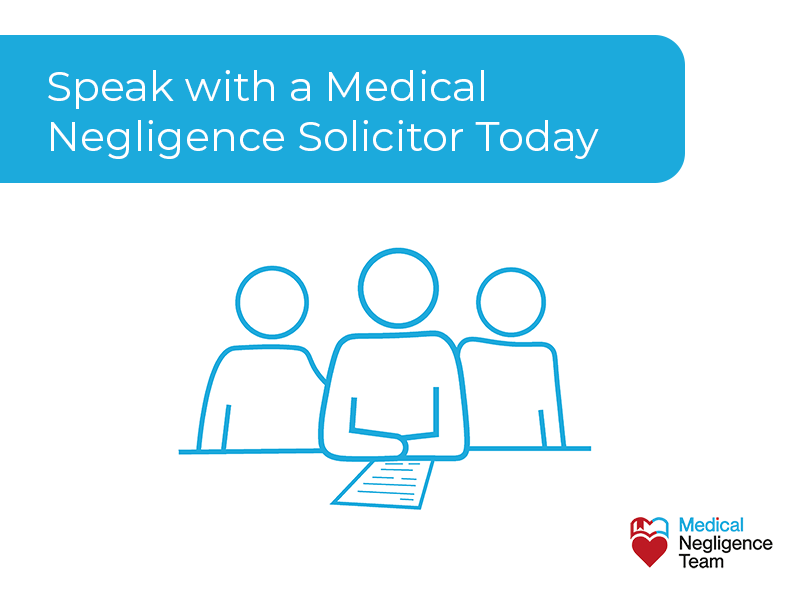Failure to treat a patient is medical negligence. It is failure to treat when you go to Accident & Emergency and do not get the care you need. Your GP not sending you for further tests leading to ill health is also failure to treat.
You expect acceptable care when you go to A&E or to see your GP. Failure to treat is care you receive below professional standards. It is care that no other medical professional would provide when doing their job correctly.
Failure to treat is unacceptable medical negligence. You can claim medical negligence against the doctor or healthcare provider when you suffer failure to treat negligence.
The Medical Negligence Team offers a prompt and experienced solution to winning your claim for failure to treat.
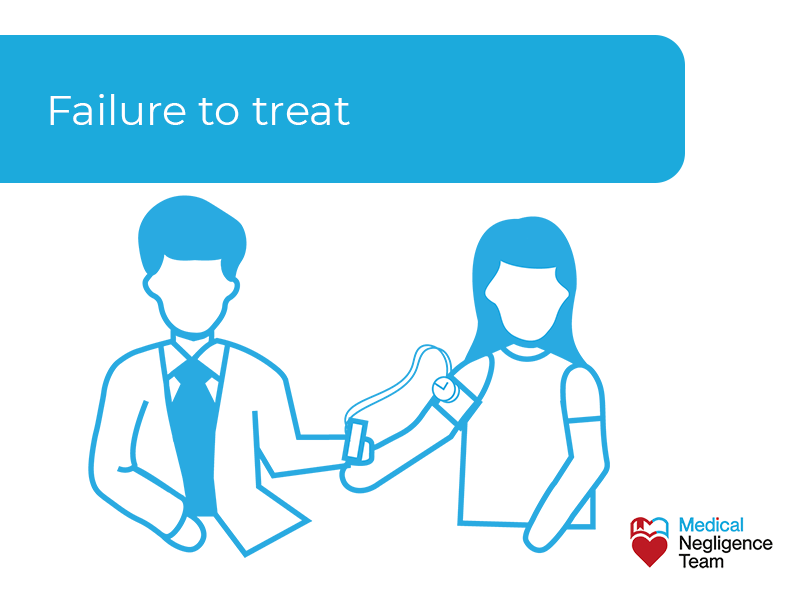
Table of content
What is failure to treat?
Failure to treat is when a doctor does not examine a patient who is ill. It is failure to treat negligence when the doctor does not diagnose your illness or refer you for further treatment.
There is not any excuse for failure to treat negligence. If you do not get the medical treatment you need because it is failure to treat negligence.
When the hospital is short-staffed, and you receive below acceptable standards of care, it is failure to treat negligence.
Medical negligence is when you suffer from a low standard of care. Failure to treat negligence is a form of medical negligence with serious consequences.
Example of failure to treat negligence?
An example of failure to treat negligence is when you see a doctor with central pain in your chest, but the doctor doesn’t see you promptly. They do not give you the attention and treatment you need.
You are forced to wait hours in the A&E department or to speak to your GP or NHS 111. In reality, you are having a heart attack, and the failure to treat means your heart condition is getting worse.
Instead of the doctor prioritising your symptoms and sending you to hospital, you are left to deteriorate in the waiting room. The damage to your heart may be permanent, leaving you with a weak heart and a lifetime of taking medications.
You can claim medical negligence compensation for the doctor’s failure to treat your heart condition.
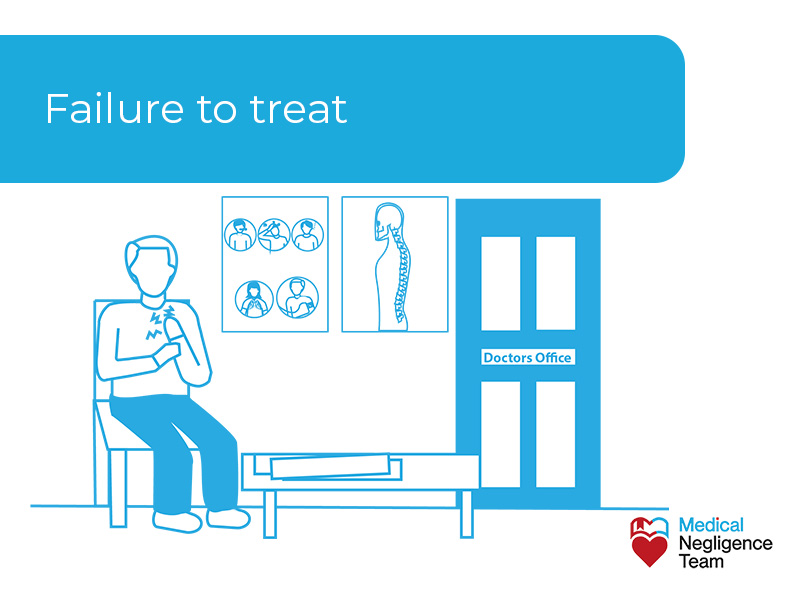
Common claims for failure to treat negligence
Common claims for failure to treat negligence are:
Failure to treat medical negligence is when you do not receive acceptable medical care from your doctor. You will suffer as a result, and the effects can be life-changing for many people.
Failure to treat a medical condition claim
Failure to treat a medical condition is when the doctor does not give symptoms, such as for a stroke, due care. If you are having a stroke, prompt intervention is vital; you should not be ignored.
The doctor does not take note of what is happening to you. Your discomfort, pain and suffering are being ignored, and the doctor is responsible for the negligence.
Failure to treat you in a timely manner means your stroke is not being treated. Early treatment is crucial, and failure to treat means lifelong health issues for you.
Failure to inform a patient about available treatment claims
Failure to inform a patient about available treatments is when the doctor does not give you information about treating a condition.
You take your baby to the doctor with the beginnings of eczema. They give you a skin cream but do not inform you about other treatments, such as a change in diet, different medications or allergy tests.
The baby’s eczema gets worse and leads to months and years of suffering, which could have been avoided with other available treatments.
Failure to carry out routine medical test claims
Failure to carry out routine medical tests is when your doctor omits the standard tests for your symptoms.
You present at the doctor not feeling well. Instead of doing a urine sample or blood test, they tell you all is fine and send you home. Not checking your blood and urine or doing a simple body examination can miss the beginnings of many conditions.
Later your missed appendicitis worsens, meaning an emergency admission to hospital and even hours of surgery. A few simple tests would have diagnosed your appendicitis and saved you time and suffering.
Failure to treat a medical condition by not carrying out standard tests is medical negligence, and you can file a compensation claim against the doctor.
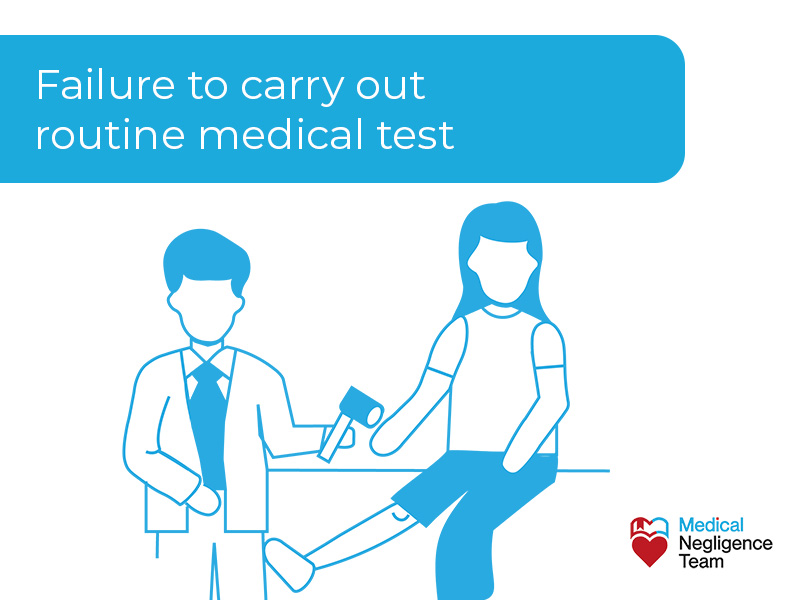
Failure to refer for further tests or treatment claims
Failure to refer for further tests or treatment is when the doctor does not send you to a consultant or the hospital for medical care.
If you tell a doctor you have chest pain, but they diagnose indigestion, they are putting your life in danger. Chest pain should be taken seriously as a sign of a heart attack, and the doctor should send you to the hospital for further tests and treatment.
Failure to refer for further tests can make a bad situation worse. Vital time is lost in your diagnosis and treatment, and in your recovery.
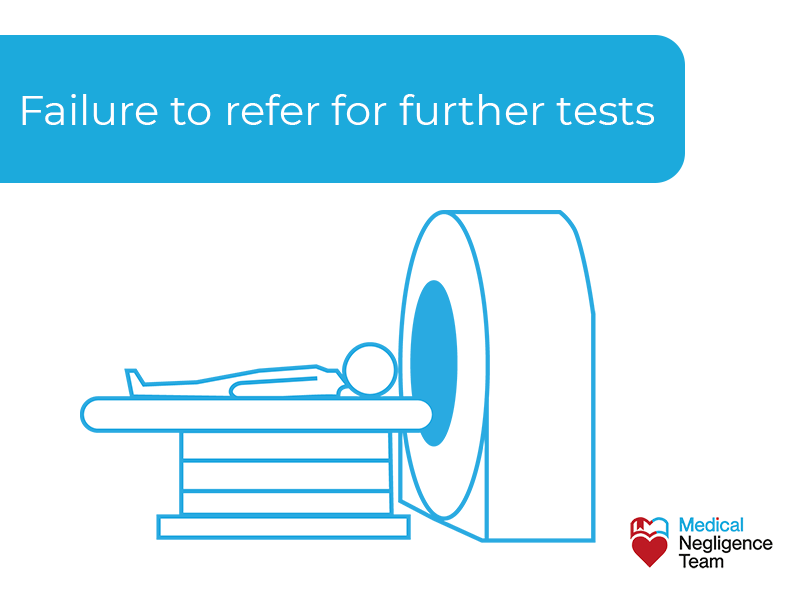
What can the effects of failure to treat or refer be?
The effects of failure to treat or refer can be a late or missed diagnosis, more pain and suffering and possible loss of life.
The doctor is responsible for your care. They are the first line in diagnosing your condition and should refer you for further, much-needed care.
A late or missed cancer diagnosis leaves the cancer to spread and may even put it beyond treatment. By being negligent in the failure to treat or refer you, they could be putting your life in danger.
You will go through a lot of further pain that could be avoided if the doctor refers you for tests and treatment. Any suffering you and your loved ones go through would not happen if the doctor carried out their job in a professional manner.
The effects of failure to treat or refer can be life-changing. A medical negligence compensation claim can get you the money you deserve to right the wrong done to you.
Who is responsible for failure to treat or refer?
A doctor is responsible for failure to treat or refer you for tests. You go to the doctor or A&E expecting professional medical service – not getting it is medical negligence.
Failure to treat is medical treatment below acceptable standards. You put your health in the hands of the doctor, who should give you full attention and treat your symptoms correctly.
When a doctor is responsible for failure to treat you, they are committing medical negligence.
You can make a medical negligence compensation claim against the doctor or hospital for any damages and losses you experience.
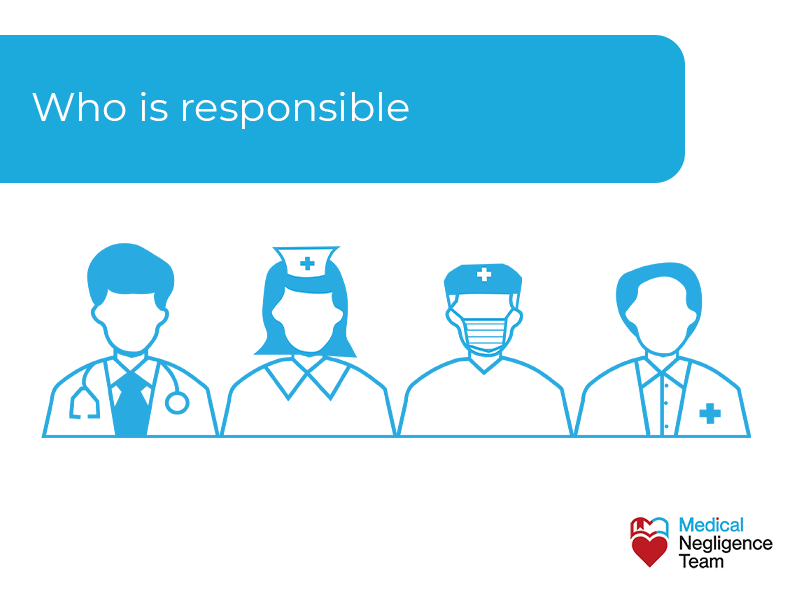
Can I claim compensation for failure to treat negligence?
Yes, you can claim compensation for failure to treat negligence. Poor standards and unacceptable medical care should not happen, and it is due to medical negligence by a medical professional
You claim compensation for any damages arising from medical negligence.
There are two types of compensation damages due when suing for failure to treat negligence: General damages and Special damages.
General damages
General damages are when you sue for the pain, suffering and the loss of amenity, PSLA, you have experienced due to negligence.
Special damages
Special damages include loss of earnings, future care costs, and out-of-pocket expenses.
Be sure to keep payslips, receipts and proof of any losses you experience as a result of the medical negligence.
When you suffer from the effects of failure to treat negligence, you sue for compensation. You deserve the compensation to cover all medical costs and any long-term care needs.
The steps involved when suing for failure to treat negligence
The steps involved when suing for failure to treat negligence are a part of any successful compensation claim. Your medical negligence solicitor will do the rest when you follow them correctly and get all the facts and figures together.
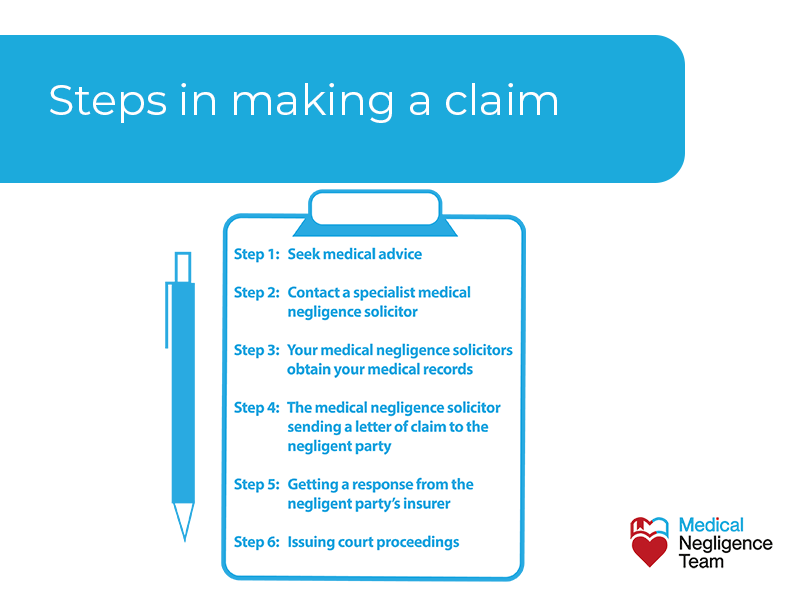
Step 1: Seek medical advice
Seek medical advice on the injuries you have suffered or are suffering with immediately you realise you experienced failure to treat negligence.
Step 2: Contact a specialist medical negligence solicitor
Contact a specialist medical negligence solicitor who operates on a No Win No Fee basis and tell them what went wrong. The right solicitor will look at your case, see where the problem lies, and advise if you suffered failure to treat negligence.
The Medical Negligence Team also have a 100% Compensation Guarantee scheme, where you get all the money awarded in a negligence claim.
You are the one who suffered medical negligence, and you should get all the money due for the suffering.
Step 3: Your medical negligence solicitor obtains your medical records
Your medical negligence solicitor obtains your medical records with your permission. By reading your records, they will confirm if they think you have a valid failure to treat negligence case.
The medical negligence team will know from reading your medical records if the case will result in failure to treat negligence compensation being paid.
Step 4: The medical negligence solicitor sending a letter of claim to the negligent party
The medical negligence solicitor sending a letter of claim to the negligent party is the next step. The letter will ask them to admit maternity negligence in what is known as ‘sending a letter of claim.’
When the negligent party receives the letter of claim, it has up to four months to provide a written response.
Step 5: Getting a response from the negligent party’s insurer
Getting a response from the negligent party’s insurer will move your compensation claim closer to a conclusion.
The insurer will either admit the medical negligence or say they intend to defend the case. Deciding to defend the case is known as ‘deny liability’ in legal terms.
If they admit liability, your failure to treat negligence claim can be valued.
The two parties will meet to decide on your failure to treat negligence compensation payment.
Your solicitor will negotiate with the negligent party and use their experience to get the compensation you deserve.
Step 6: Issuing court proceedings
Issuing court proceedings is the next step if they deny liability in your failure to treat negligence case. Going to court happens, too, when they are not prepared to pay a fair amount for the injuries you have suffered.
Your medical negligence solicitor issues the court proceedings.
Remember that less than 1% of medical negligence cases go to trial.
Our Process
Our team members have a higher career win rate with a 75% success rate on NHS letters of claim, compared to an industry average of 54.5%.
Enquiry
The first step is to get in touch and tell us what went wrong. It’s free and easy. Call our 24-hour helpline: 0800 246 1122 or request a callback here.
Medical Evaluation
Once you have spoken with our team we’ll let you know how we can help. Typically the next step is to obtain your medical records for us to review.
Legal Letter
Once all your medical records have been received they will be reviewed by a medically & legally qualified member of our team. If there is evidence of medical negligence we will send a letter of claim to the negligent party outlining your medical negligence claim.
Using a No Win No Fee solicitor
Using a No Win No Fee solicitor is the only way to a successful failure to treat negligence claims. Your No Win No Fee medical negligence solicitor will not charge you for a claim you do not win.
If any solicitor starts talking of a ‘win fee’ or a ‘success fee,’ you should walk away. The negligent party insurers should pay all your legal fees and you should get 100% compensation.
The medical negligence solicitor should also operate a 100% Compensation Guarantee scheme. When you win the case, all the money awarded should go to you, not the solicitor.
You are the one who suffered the failure to treat negligence, and you deserve the compensation to get your life back to normal.
How long do I have to make a claim for failure to treat negligence?
You have three years to make a claim for failure to treat negligence. All medical negligence claims are subject to limitation periods.
For example, in England and Wales, medical negligence claims must generally be brought, court proceedings issued within three years of the injury, or three years of knowledge of the facts giving rise to the claim.
If someone has passed away, the three years would start from the date of death if the limitation period has not already expired at the date of death.
Children not under a disability typically have until they reach 21 to start a failure to treat negligence claim or court proceedings.
Persons under a disability, who lack capacity, are not subject to any limitation period.
Contact The Medical Negligence Team
Contact the Medical Negligence Team today to discuss your failure to treat negligence claim for compensation. We have both the legal and medical experts to guide you along the steps to a successful medical negligence claim for compensation.
At the Medical Negligence Team, we fight every compensation claim on a No Win No Fee basis. You will not be out of pocket for an unsuccessful claim.
We have a very high success rate and a reputation for a speedy and successful resolution to all medical negligence cases.
Our 100% Compensation Guarantee puts all the money you win into your pocket. You are the one who suffered the negligence, and you deserve every penny of the compensation.
Contact us at the Medical Negligence Team for all your medical negligence needs.
